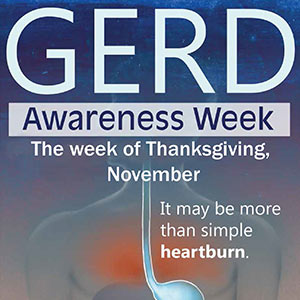
Not coincidentally, GERD Awareness Week overlaps with the Thanksgiving holiday. Many people get acid indigestion from time to time, especially during this month of major feasting, but if you suffer from more than occasional acid reflux, you may be among the 20 percent of U.S. adults with gastroesophageal reflux disease, or GERD. For many individuals, painful heartburn often accompanies acid reflux; however, for others there are few or no symptoms. In the latter situation, dentists may be the first to suspect GERD based on what we see during a regular dental exam.
With GERD, acid washes up from the stomach into the esophagus or throat, and even into the mouth. If the condition is not treated, the repeated contact with acid can lead to ulcers and cause pre-cancerous cell changes along the esophagus lining. In addition, the acids can eat away at tooth enamel and harm the soft tissues of the mouth, which may result in severely eroded teeth and chronic gum disease. Unfortunately for those who have relatively minor symptoms, GERD may go undetected until serious damage has been done. For this reason, diagnosis and treatment of GERD is very important.
You can play a big role in managing your GERD symptoms. Besides taking any over-the-counter or prescription medication your doctor recommends, you can help control acid reflux by eating smaller meals, avoiding foods and beverages that trigger heartburn, refraining from eating within three hours of bedtime, and resisting the urge to recline right after eating. Also, quitting smoking and taking off extra weight can help greatly.
Further, it is important to take steps to protect your teeth if you suffer from GERD. Here are some tips:
- Neutralize acid by chewing on an antacid tablet or rinsing your mouth with half a teaspoon of baking soda mixed into a cup of water.
- Don't brush your teeth immediately after an episode of acid reflux, as this could damage the weakened tooth enamel. Instead, rinse your mouth with water to dilute the acid and wait an hour before you brush to allow your saliva to rebuild the minerals on the surface of your teeth.
- Schedule regular dental visits to monitor the health of your teeth and gums. Depending on your specific situation, we may recommend a particular treatment to help strengthen your teeth.
Our goal is to help you preserve your teeth for life, so be sure to tell us if you have been diagnosed with GERD or any other medical condition. If you have questions, contact us or schedule an appointment for a consultation. You can learn more in the Dear Doctor magazine articles “GERD and Oral Health” and “Tooth Decay: How to Assess Your Risk.”